What Not to Feed Chickens in Your Backyard
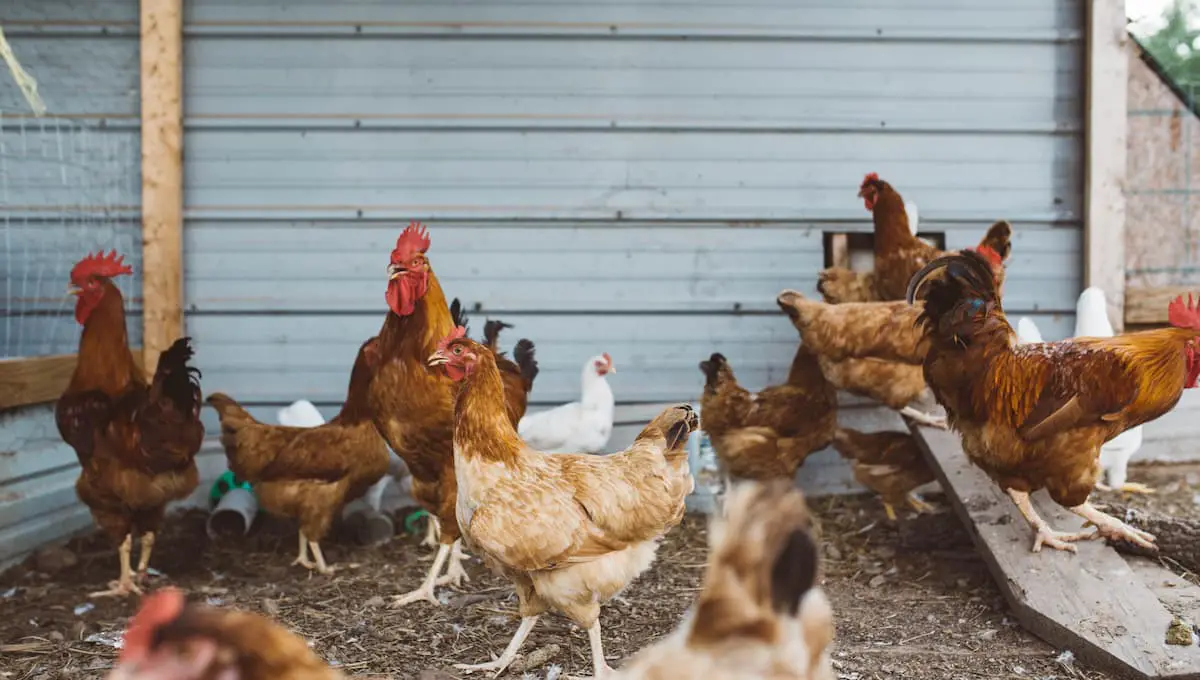
If you own chickens, the first thing you’ve probably learned from experience is that chickens are eating-machines. If they aren’t sitting on their eggs, you’ll find a brood of chickens scratching at the ground for insects, worms, and other grubs. Despite their hardy digestive systems, there are certain food items chickens can’t and definitely shouldn’t eat. If you’ve ever been curious about these foods, well you’re in luck. We’re going to break down for you what not to feed chickens in your backyard.
Like us, chickens are omnivores and can eat some of the waste and scraps we don’t use as supplemental feed. However, if you’re wondering about the foods not to feed chickens, you’ll find that the lists found online vary, and more often than not, feeding your clutch is a trial-and-error process.
This article looks at what chickens can and cannot eat, focusing on edible items not to feed your lovable chooks (aussie slang word for chickens), everyday produce that your chickens need for a balanced diet, as well as treats that they can enjoy occasionally.
What to Feed Chickens: Essential Items
Before we look at what not to feed your chickens, we should focus on which chicken feeds that need to be bought for every day survival.
Chicken feed contains macro ingredients, such as cereal grains (wheat, barley or sorghum), oilseeds (soya bean or canola meal), and animal by-products. Chickens derive most of their energy from cereal grains, which makes up 60-70% of the feed.
Depending on the type of chicken it is, you’ll need to pick out a feed that contains the essential vitamins, protein, and minerals. For example, you may own backyard chickens as pets like the beloved Serama Bantam, but it’s a bonus if your brood produces healthy eggs for breakfast and to sell to your neighbors.
For high-quality eggs to be produced, your hens need calcium, which they can absorb from a specially formulated feed.

One really great chicken feed that’s rich in calcium and GMO free is Small Pet Select Chicken Layer Feed. This chicken feed is soy free, corn free and is often sold in 10 or 25 pound quantities.
Considering half the volume of an egg comprises water, chickens need access to fresh and clean water at all times.
What Not to Feed Chickens List
To prevent wasting food, many chicken owners feed their poultry the food they don’t eat, including peels, as well as vegetables and fruit that’s on the verge of rotting.
While, for the most part, this is an effective way of keeping your flock of chickens well-fed, you do run the danger of accidentally poisoning them if you happen to throw something in your compost heap that poultry can’t digest. So what scraps should you not feed chickens?
It’s generally understood that what’s healthy for humans is suitable for chickens where particular food items are permissible in moderation. Questions people commonly ask include are, can chickens eat butter and sugar?
The answer is simple, the above is bad for individuals to consume in excess, and it’s not recommended for fowls either.
You might also enjoy our post on Where to Buy Serama Chickens Online
Lets Outline What Things Not to Feed Chickens
Dried or Raw Beans
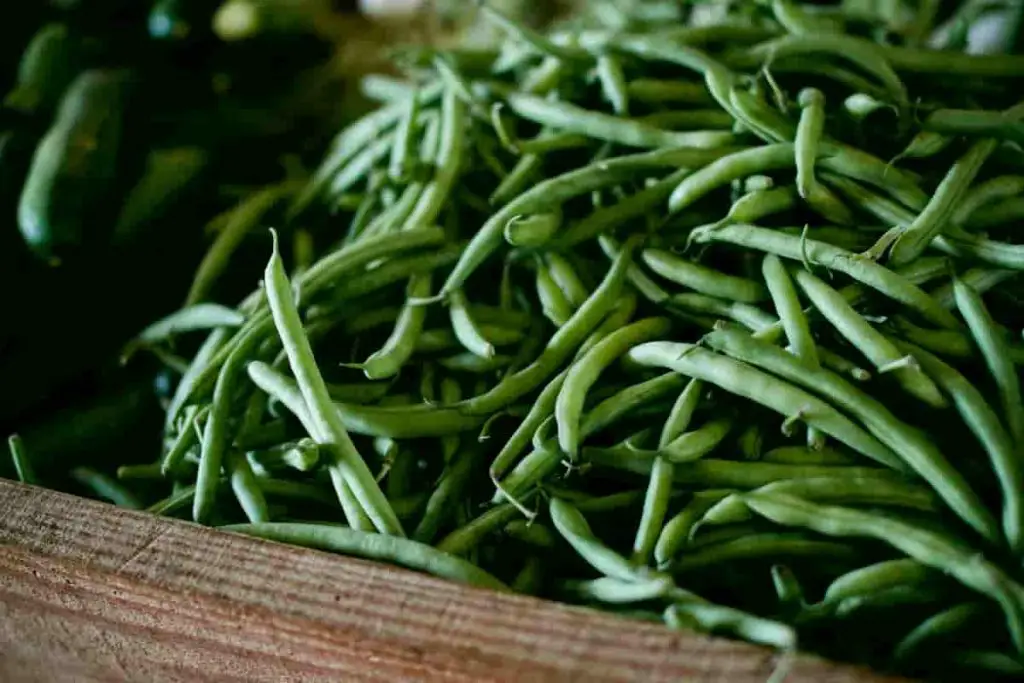
Dried or raw beans are on the top of the list for things chickens should not eat.
Never feed your hens dried or raw beans because the protein can prove fatal to poultry. If beans form part of your chicken’s diet, make sure that they’re properly cooked before you feed it to them. Once consumed, there’s little you can do to save your backyard chickens, as few as three or four beans digested is enough to kill them.
Why dried or raw beans are so poisonous to chickens is because it contains a toxin called phytohaemagglutinin. Phytohaemagglutinin, which is a plant protein, is lethal to chickens. Signs that your pet birds may be poisoned include extreme vomiting and diarrhea.
Ways to prevent the above from happening is to cook your beans properly, and if you have bean plants in your garden – keep them out of reach of your brood, especially if your chickens are free-range.
If you’re paranoid about your chickens foraging in your backyard, gain peace of mind knowing that while poultry has a diverse pallet, they stay away from things that aren’t beneficial to them healthwise, notably wild plants that are highly toxic.
Can Chickens Eat Green Beans?
Similar to other types of beans, green beans are deadly if consumed raw.
Avocado
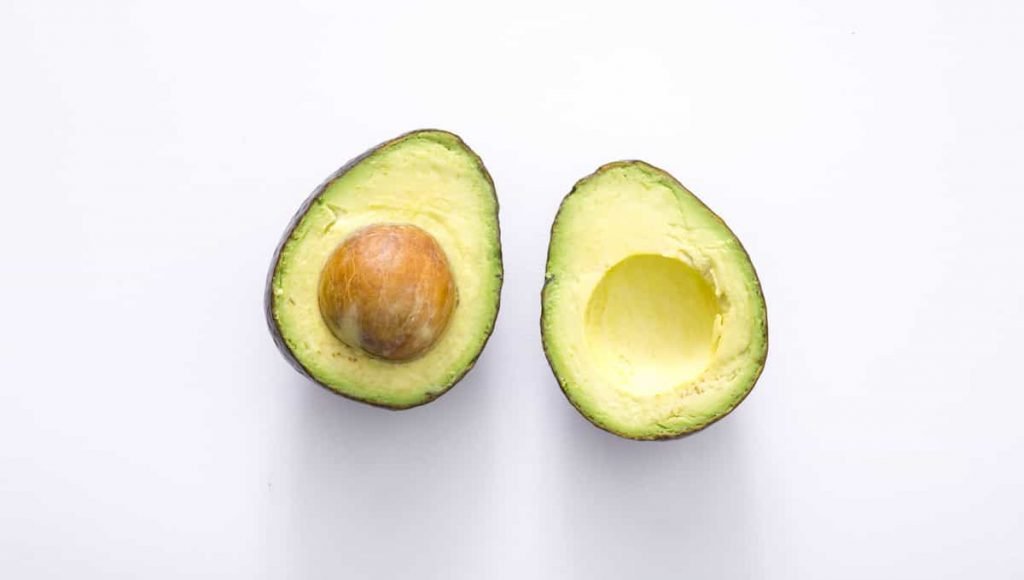
We might love to spread a fresh avocado on toast, but the fat, which is healthy for us, can be toxic to chickens.
We say “can be” because the flesh of an avocado can be eaten in moderation by your backyard pets. However, some chicken owners err on the side of caution altogether by not incorporating avocado into their flock’s diet.
Avocado flesh is edible because it contains low levels of persin, which is toxic in high amounts. The pit and skin aren’t okay to eat due to its concentrated quantity of the toxin, which consumed in large doses lead to heart issues in chickens, and unavoidable death in 48 hours or less.
Chocolate
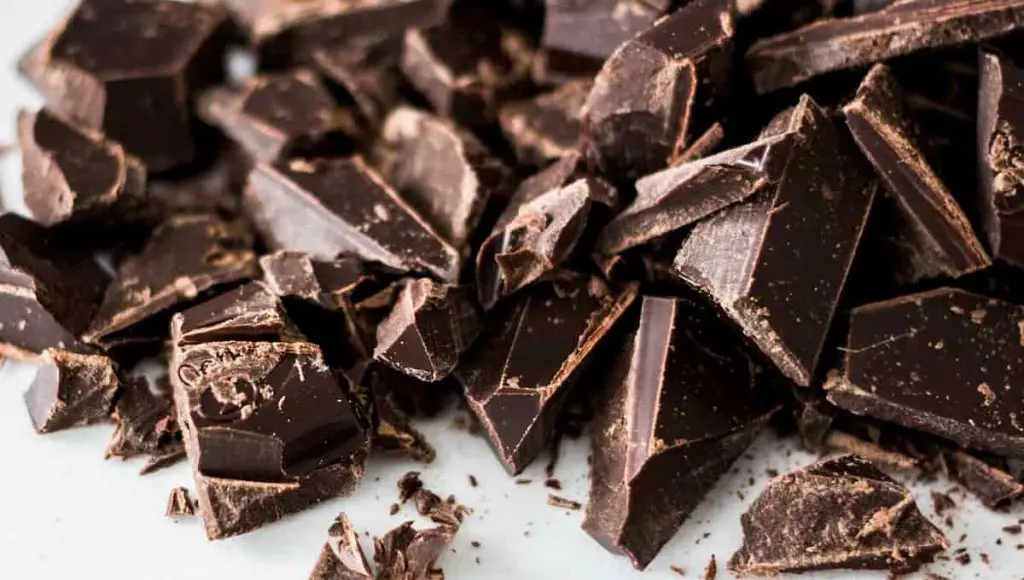
This may seem obvious, but another item on the list of what not to give chickens includes all forms of chocolate.
Like dogs and other animals, chocolate kills chickens because properties comprising chocolate, namely theobromine and caffeine, is dangerous for our feathered friends.
So if you’re considering spoiling your backyard flock to chocolatey goodness, don’t. Instead enjoy the treat yourself – not only delicious but the tasty treat, especially dark chocolate is a healthy addition to your diet.
Coffee, coca-cola, and other drinks containing caffeine aren’t fit for chicken consumption either – that said, the only liquid your brood should be drinking is non-contaminated water.
Moldy Food
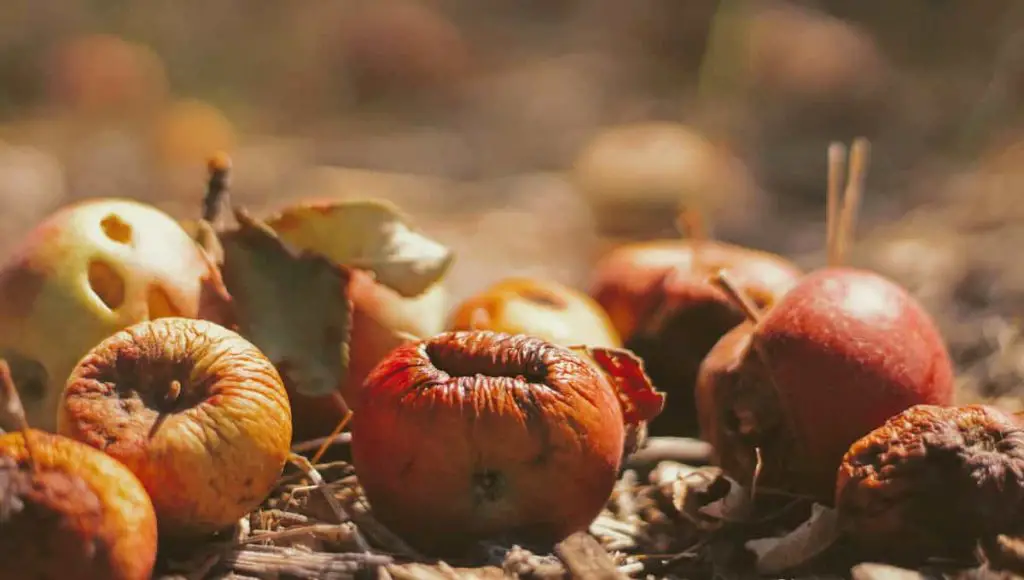
Common mistakes chicken owners make include feeding their flock moldy fruit and vegetables in efforts not to waste food. The general rule of thumb here is that you can feed chickens fruit and vegetables that are overripe, but if you see patches of mold, throw the food items in the trash immediately.
While there are many types of mold such as penicillin that are good, and mold on some cheeses speaks to the maturity of the cheese, you generally don’t want that stuff growing on your edible items, nor do you want to feed it to your precious pets.
The mold that grows on soft fruits and vegetables contain toxins, in particular, aspergillus flavus that contributes to liver cancer in humans and animals alike.
Onions
Can Chickens Eat Onions?
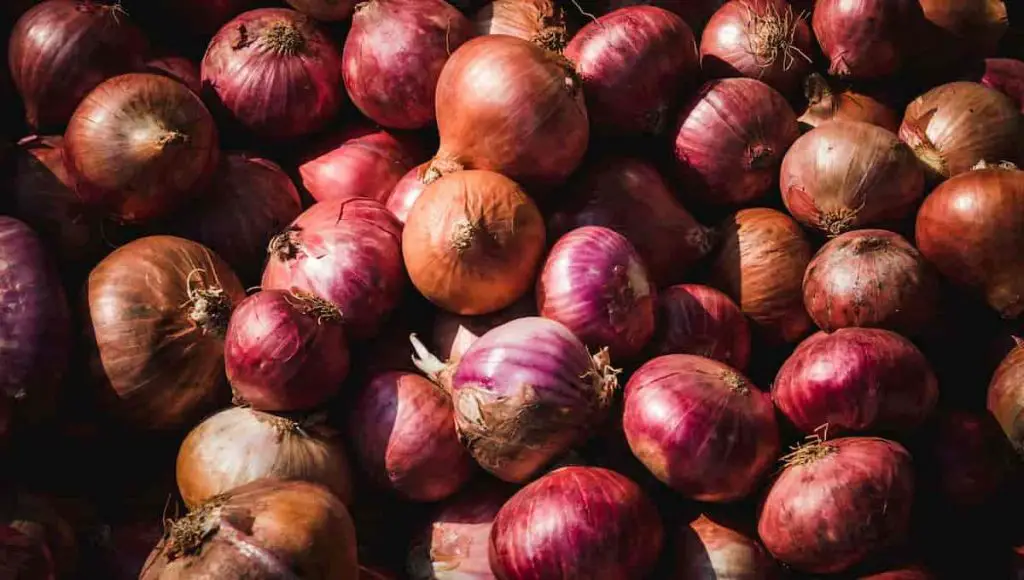
There are many arguments about whether onions can be fed to poultry in small amounts, but the dangers of feeding your chickens too much are two-fold.
Firstly, the bulb, which we cook with, affects egg production in the sense that if a hen has a diet dominated by onions, the eggs she lays may have a powerful and distinct odor.
Secondly, ample supplies of onion could lead to anemia, a blood condition, or jaundice that could leave your chicken colony weakened, listless, and appearing unkempt. This is because onions contain thiosulphate, which destroys red blood cells.
Feed onions to chickens the same way you would your family – you wouldn’t serve up platefuls of onion for supper, knowing the health implications. Therefore you shouldn’t fill your chicken feeder with onions either.
Green (or raw) Potatoes and Tomatoes
Can Chickens Eat Cooked Potatoes?
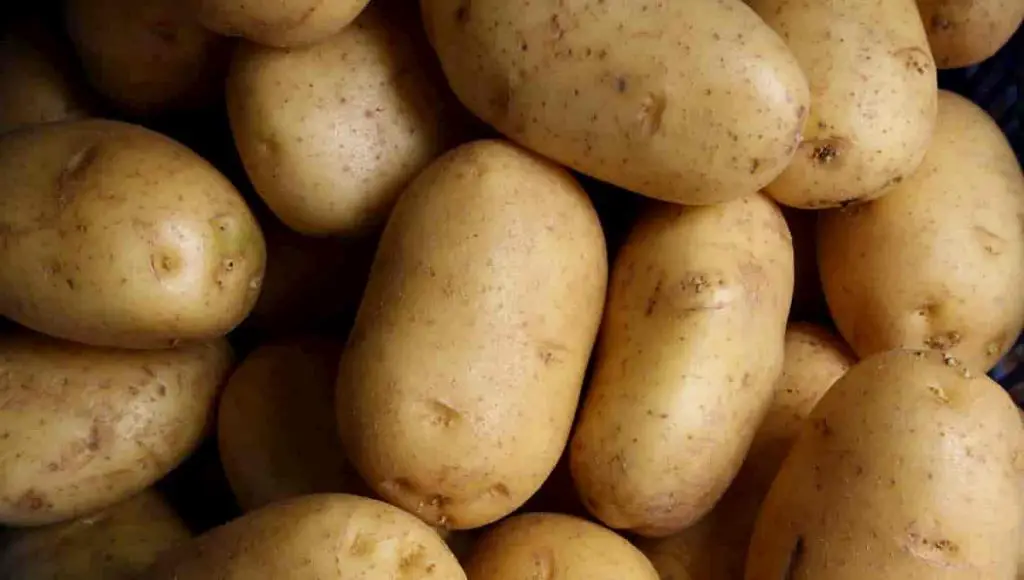
The answer to this question is unequivocally yes. Chickens are great fans of potatoes, especially mashed up or even leftovers in moderation.
However, you shouldn’t be feeding your fowls raw potatoes, for the same reasons you wouldn’t want the vegetable raw yourself. That said, the jury is out on this one because some chickens experts would contest otherwise.
At the same time, green taters contain solanine, which is found in the peel, flesh, and sprouts. When a green potato is eaten, drowsiness, paralysis, and the death of your chickens will soon follow.
Some individuals are of the mistaken assumption that boiling the potato makes it less toxic- it doesn’t.
Exposure to sunlight turns these vegetables green; prevent this from happening by storing your spuds in a cool, dry space.
Peanuts
Can Chickens Eat Peanuts in the Shells?
There isn’t enough information about peanuts. However, the nut is unhealthy for birds and other small mammals. With this in mind, we’d say avoid peanuts.
Pickles
Can Chickens Eat Pickles?
It may be a type of cucumber, but the brine in which it’s marinated is high in salt and sugar, making it an unhealthy treat for the chicken.
You might also enjoy our post on My Neighbors Chickens Are in My Yard
What Do Chickens Like to Eat

We’ve mentioned before that the list featuring what you can feed chicken is exhaustive (which we’ll look at later on), but are there specific items that fowl just can’t get enough of?
Before chickens became the domesticated poultry that we know today, they roamed wild and foraged for food on their own.
Wild or feral chickens eat several types of things, including various insects, mealworms as a source of protein, seeds, and berries.
If you have a spacious garden, allow your flock to move about in search of food. Not only is it one of the cheapest ways to feed chickens, but it exercises your colony, thus preventing them from becoming overweight for all the treats you’ve been feeding them!
One surefire way of getting your flock moving and piquing their interest is to scatter seeds around your garden for them to forage.
One highly recommended meal-worm snack that chicken owners love to toss their birds is Happy Hen Treats Party Mix
You might also enjoy our post on How to Keep Your Neighbors Chickens Out of Your Yard
Can You Have Both a Garden and a Roost of Chickens?
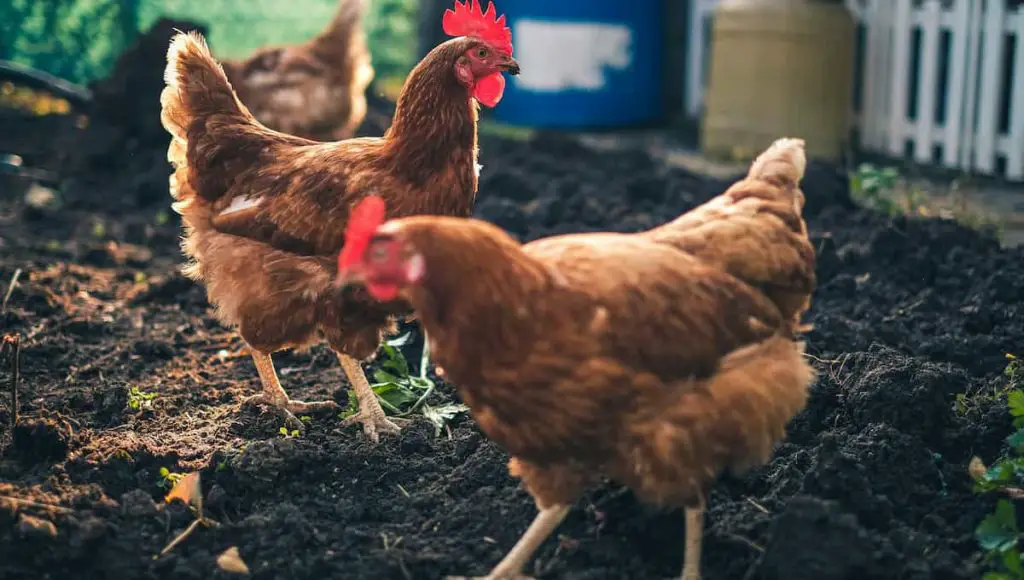
Chicken lovers may be paranoid about letting their flock loose in their garden because they’re unsure of what you can feed chickens, not to mention which ornamental plants are toxic for consumption.
That said, unlike other types of animals, chickens generally won’t eat what’s bad for them. At the same time, there are far more appealing food sources in the backyard than the foliage of plants. Unless your chickens are wholly deprived of food, this won’t become a problem in the future.
Read the below list of highly poisonous plants, and if you have any in your yard, err on the side of caution by pulling them out or replanting them somewhere in your yard that isn’t accessible to your brood.
Plants That Are Part of the Nightshade Family
These include tomatoes, eggplants, and potatoes. We’ve mentioned earlier that solanine, a deadly toxin, is contained in the vegetables mentioned above, so it goes without saying that the plants are also dangerous.
Plants From the Buttercup Family
Nemone, clematis, delphinium, and ranunculus form part of the buttercup family and are highly poisonous, not just to chickens, but also humans and cattle.
Buttercups species come in various forms but are usually identified by their small white or yellow flowers.
Rhubarb
Rhubarb pie may be delicious, but its leaves are highly toxic for chickens and humans alike.
The leaves contain oxalic acid, a highly poisonous toxin that causes jaundice, tremors, and increased salivation in chickens.
Azaleas
With their waxy, green leaves and vibrant flowers, azaleas are pretty to look at and popular to have in the garden.
However, these shrubs are dangerous in various ways to chickens where its ingestion leads to weakness, loss of coordination, an upset digestive system, and cardiac issues that could result in the death of your chickens.
Bean Plants
As we’ve mentioned previously, raw beans cause imminent death in chickens. However, this should not mean you must stop growing bean plants, but you should consider re-planting them in areas where your chickens won’t forage.
Bracken Ferns
Bracken ferns are known to cause bracken fern poisoning in chickens when consumed in large amounts, resulting in anemia, weight loss, and muscle tremors.
That said, while ferns make excellent ornamental plants, this specific type grows aggressively and needs continual maintenance – which may put you off planting the species in the first place.
Foxglove
Identified by its tubular-shaped, brightly-colored flowers, and speckled interior, the foxglove is lovely to have around, especially in summer when it’s in full bloom.
However, foxglove is dangerous to have around because the entire plant is highly toxic for chickens. Not only that, but the plant species is highly fertile – which increases the chance of your chickens accidentally ingesting its seeds while pecking at the ground.
Remove the plant entirely if you have free-range chickens.
Holly plants
Holly plants are pretty to have around and are decorative over the December holidays.
While chicken can nibble the red berries, the leaves are highly poisonous can cause a bad case of vomiting, diarrhea, and drooling
You might also enjoy our post on Do No Crow Collars Work?
What Can Chickens Eat List

At this point, you may be wondering what do you feed chickens or what you can feed chickens?. Ultimately there is no definitive list for this However, what follows includes some of the food items that chickens can eat in small quantities.
Remember that while chickens eat everything, the below should not replace regular chicken feed, which is specially formulated with the essential vitamins and minerals for a well-balanced diet.
While chickens are known to avoid food that is dangerous to them, they may eat something poisonous if they aren’t fed enough.
Treat these as spoils for your beloved chicken, in the same manner, you would any other pet.
Chickens also tend to scratch at the ground for feed using their toes, if you really want to spoil them, let them try some Manna Pro Chicken Scratch Feed
A Brief Overview of What to Feed Your Chickens
We’ve included some of the food that chickens eat, which is a very comprehensive inventory. If there’s something not mentioned, ask friends or family with experience for advice or inquire with your local vet.
A Variety of Fruit
Combine your chicken feed with various fruit, such as apples, bananas, grapes, strawberries, and more, which we will look at in some detail.
Bananas
Do you have spotty bananas that you refuse to eat? Your hens will love them, plus they contain a cocktail of vitamins that chickens need, including vitamins B6, C & A, as well as niacin, iron, and magnesium.
Berries
It comes as no surprise that berries are a much-loved fruit in the world of chickens. Before they became commercially produced, feral chickens and fowls foraged from the land where berries were an everyday staple.
Strawberries are a great hit with the birds. Not just delicious but also contains anti-inflammatory properties and filled with necessary anti-oxidants.
Citrus
Can Chickens Eat Citrus?
There are myths about whether or not citrus is healthy for chickens, but it turns out that it is.
However, while the nutritional elements of the fruit are incredible, hens aren’t sold on the acidic taste.
Can Chickens Eat Grapefruit?
The answer to this question is the same as above regarding citrus; Chickens can eat grapefruit, and it’s incredibly healthy for them, but chickens tend to turn their beaks up at any citrus-based fruits.
Cantaloupe
For us, a cantaloupe melon is a juicy and delicious fruit, and your colony of birds will share the sentiment.
Can chickens eat cantaloupe rinds, though? Chickens pick the fruit clean, seeds and all, and receive a surge of vitamins A, B & C for it.
Grapes
Fermenting grapes leave us with an acrid and unpleasant taste in our mouths, but is a nutritious and tasty treat for our feathered friends, plus they’re high in vitamin b, a, and c, not to mention trace amounts of calcium and copper.
Peaches
You can feed your flock slices of peaches but don’t offer them the fruit whole without cutting it up – the pip is inedible to chickens as it contains cyanide.
Can Chickens Eat Peach Skins?
No harm is done from eating the skin, which like the rest of the fruit, contains various vitamins and water, which is essential for the growth and maintenance of your hens.
Chickens love all the above but don’t feed them too much as this could upset their digestive system.
Many people wonder whether chickens can eat apple peels and banana peels. The answer’s yes, chickens munch on whole fruits, including the parts we don’t eat, except for the seeds which are harmful (apple seeds, containing cyanide are especially toxic).
With banana peels, it’s a good idea to cut it up or stick it into the food processor to create more digestible pieces for your chickens.
Assorted Vegetables
Like fruit, chickens love to eat vegetable kitchen scraps and aren’t fussy about which types you put in their feeder.
Broccoli
The green vegetable is a popular snack to feed chickens, which is loaded with necessary nutrients and low in fat.
Cucumber
Cucumber is a refreshing treat to have on a hot day, and due to it being made mostly of water, it helps to keep your fowls hydrated, plus they’re also healthy and contain multiple vitamins..
Chickens can also eat cucumber peels, which are good for them too.
Potatoes
Despite having only a few nutritional benefits, potatoes are fine to eat, but can chickens eat potato peels? The peels are safe to eat, given that it’s not yellow.
If chickens can eat potatoes and potato skins, you may be wondering can chickens eat yams? Some people claim that yams or sweet potatoes are loaded with essential nutrients, and therefore healthier for chickens to eat.
Squash
Like potatoes, squash is a daily and nutritious staple for chickens who love the flesh and seeds.
Can chickens eat spaghetti squash, though? They can, and they enjoy the taste of the delectable snacks cooked or raw, it doesn’t matter.
On top of the above vegetables, it’s crucial to incorporate leafy greens into their diets, such as spinach, kale, and lettuce (avoid iceberg; it’s not good for them and doesn’t have any nutritional value).
Carbohydrates For Chickens
Carbohydrates are a critical energy source for animals, especially poultry, where it makes up a significant proportion of their diets.
Typically, chickens derive this energy from corn, wheat, barley, and grain.
Corn
You should feed your flock corn because the same way humans feel about chocolate is the way chickens feel about corn – they gobble up the stuff.
It’s the easiest grain for chickens to digest, which is also high in fiber.
Corn can be fed to chickens canned, on the cob, raw or dried.
Bread
Can You Feed Chickens Bread?
While bread is nutritionally deficient for chickens, it’s an edible and inexpensive treat for your birds. You can soak the bread in yogurt or kefir to make the snack healthier. While chickens don’t digest dairy well – a small amount is beneficial for intestinal health.
Cooked Rice & Pasta
Cooked rice and pasta, comprising predominantly of carbohydrates, has no health benefits for chickens, although it’s okay for the occasional snack.
How Much to Feed Chickens
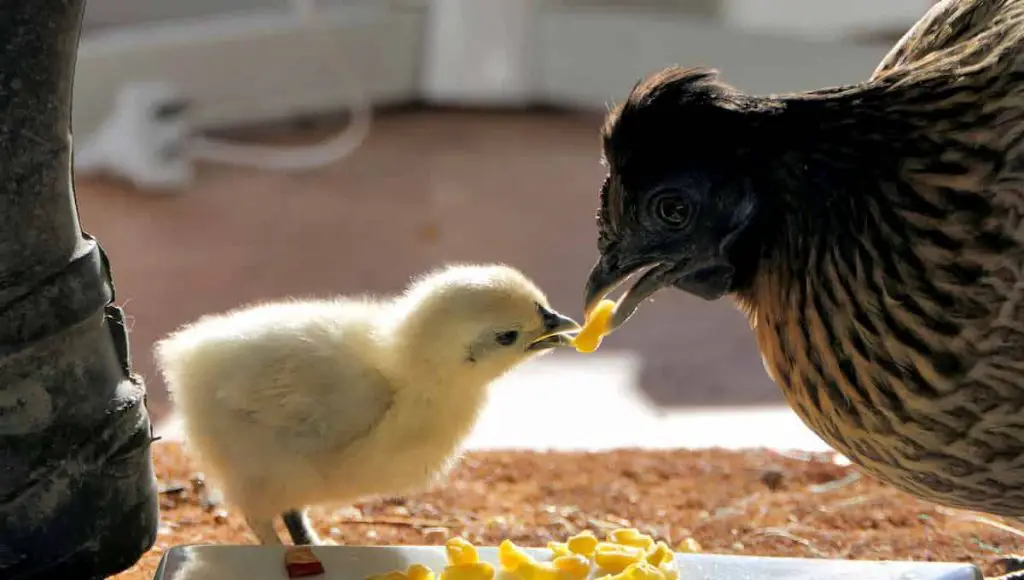
We’ve looked at what chickens eat (answer: just about everything), but how do you feed them, and how many times a day do you feed your chickens?
While both valid questions to ask, it’s impossible to give one straightforward answer because it depends on the types of chicken you’re breeding and also why you’re breeding them.
You may find the answers to the above questions change depending on who you ask. Inquire with a farmer who produces chickens for meat, and you’re likely to get an exact measurement of the daily feed to the last gram, while egg producers may answer similarly, giving a precise amount of feed per day to optimize the quality of eggs hens lay.
However, the answer varies if you’re breeding chickens for recreational purposes, i.e., to add to your poultry family as a beloved pet or show bird because it’s an imprecise science based on trial-and-error.
An estimated ballpark figure for backyard flocks is around ¼ of a pound per chicken per day, but don’t take this at face value because there are other variables present that you should look at, including how active your colony is and the type of feeders you have.
It’s a known fact that chickens are social animals that live together in groups. Whatever the number of chickens you have living in your backyard, make sure that they have enough food by installing enough feeders and by filling the feeders (which can hold up to a few days worth of food) – you’ll find that your brood will nibble, eating small amounts at a time.
If your brood is deprived of food, bullying tactics will occur where weaker members of your chicken family will be chased away and won’t eat as a result. At the same time, a starving chicken may consume things in your garden, such as toxic plants, because there’s nothing else to eat.


One easy way to remedy this is to install a chicken feeder and waterer for them. A highly recommended one is SuperHandy Chicken Feeder Automatic and the Inside or Outside Chicken Coop Feeder over on Amazon.
How Do Chickens Eat According to the Season and What to Feed Chickens During Winter?
You’ll notice that chickens have a decreased appetite over summer and consume more during winter. Either way, you must provide them meals that are high in nutrients for a balanced diet.
People often worry about their chickens when it’s icy, but they’re hardier creatures than individuals realize and thrive when it’s sub-freezing, granted the conditions are right.
They need to be fed more, especially protein, to keep up their strength. Some farmers feed corn to their colony in the evenings, so that they have something to digest and keep them warm overnight.
Another thing to account for is water. Chickens don’t drink much in winter. Regardless, they need access to fresh water anyway. Some people find it challenging to keep water from freezing, but keeping a heater in the barn might work.
Recap: What Can I Feed My Chickens?
If you’ve just bought a family of chickens, congratulations on becoming a poultry owner. Looking after chickens is relatively easy because their diet knows no bounds, but there are some essential things to note first that aim to guide you when learning how to feed chickens.
- On top of giving your chickens feed, you’ll want to spoil them like any pet, but there are the do’s and don’ts where there are everyday treats, occasional treats, and food that is outright dangerous to your prized bird.
- People often give their chickens scraps and the leftover food they don’t eat, which is fine to do. But check first what the waste is, before adding it to your compost heap. Avocado skins, raw beans, and moldy food can prove lethal to your feathered friends.
- People believe that they can either have chickens or a garden, not both because several types of ornamental plants are toxic to chickens. However, if you have free-ranging chickens, remember that they will peck at insects, worms, and grass before they nibble on your plants. For peace of mind, it’s a good idea to re-plant them in areas of the garden that chickens can’t access.
- The list of things you can feed chickens is limitless. We’ve included main fruit, vegetables, and carbohydrates, but dairy (yogurt, cheese, and milk) can also be incorporated in your chickens’ diet in trace amounts.
- How much you feed your chickens is based on numerous factors, such as the breed of chicken and the purpose of breeding them. If you’re involved with backyard farming, you’ll soon realize that it’s not an exact science. However, you should have enough feed and feeders not to deprive a family of chickens.






